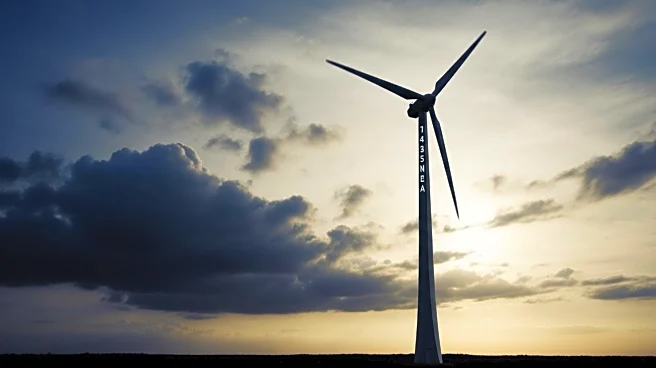What's Happening?
Orsted, a leading developer of offshore wind farms, is facing significant challenges after the U.S. government issued a 'stop-work' order for its Revolution Wind project off the coast of Rhode Island. The order, citing national security interests, comes as a surprise for the project, which was already 80% complete. This development has contributed to a 40% drop in Orsted's share value this month. The company had recently announced plans to raise 60 billion Danish kroner ($9.4 billion) through a rights issue to support its U.S. projects, but the halt has raised concerns about the viability of its growth plans and funding model. Analysts have downgraded Orsted's credit rating, reflecting the deteriorating business environment and lack of capital expenditure flexibility.
Why It's Important?
The halt of the Revolution Wind project underscores the increasing complexity and risk associated with renewable energy investments in the U.S., particularly in the offshore wind sector. This move could have broader implications for the renewable energy industry, potentially affecting investor confidence and future project developments. Orsted's situation highlights the challenges faced by companies relying on large-scale capital investments and partnerships to fund ambitious projects. The company's ability to navigate these challenges will be crucial for its future operations and could influence the strategies of other players in the renewable energy market.
What's Next?
Orsted is evaluating its options, including potential legal proceedings, to resolve the stop-work order and aims to complete the Revolution Wind project by the second half of 2026. The company is also preparing for its rights issue, scheduled for early September, which will be critical in securing the necessary funds to support its operations amid U.S. uncertainties. The Danish state, holding a significant stake in Orsted, has committed to participating in the rights issue, providing some stability. Investors and stakeholders will closely watch the developments, as the outcome could impact Orsted's financial health and strategic direction.
Beyond the Headlines
The stop-work order raises questions about the intersection of national security and renewable energy projects, highlighting potential legal and regulatory challenges. This situation may prompt discussions on how governments balance security concerns with environmental goals, potentially influencing future policy decisions. The long-term impact on Orsted's reputation and its ability to attract investment could also be significant, affecting its position in the global renewable energy market.









